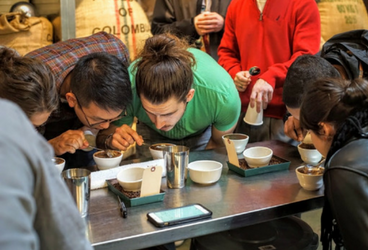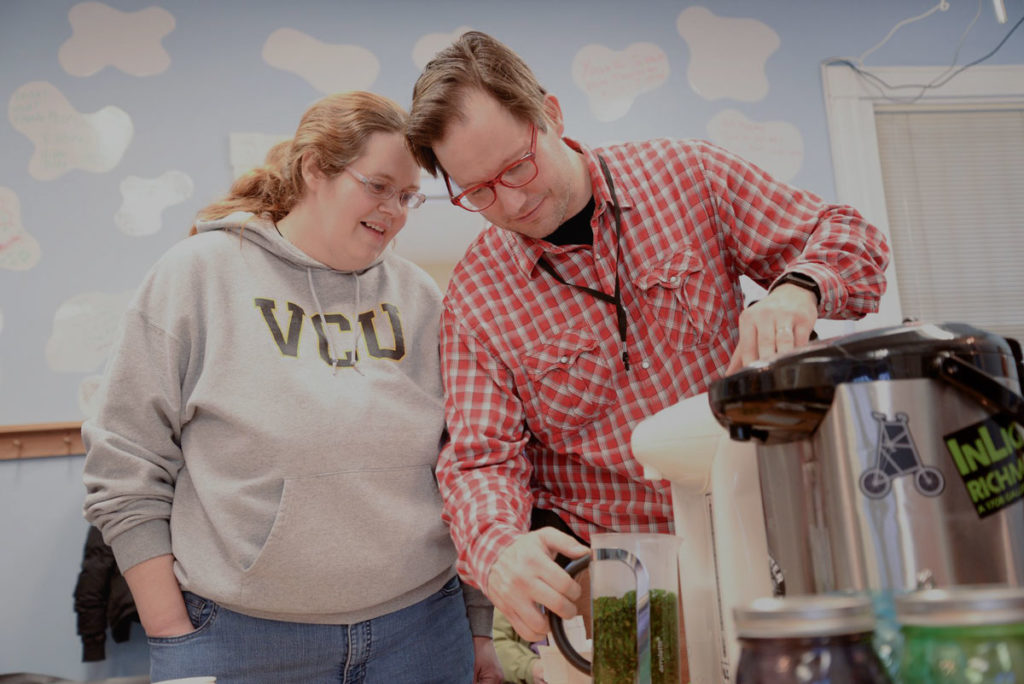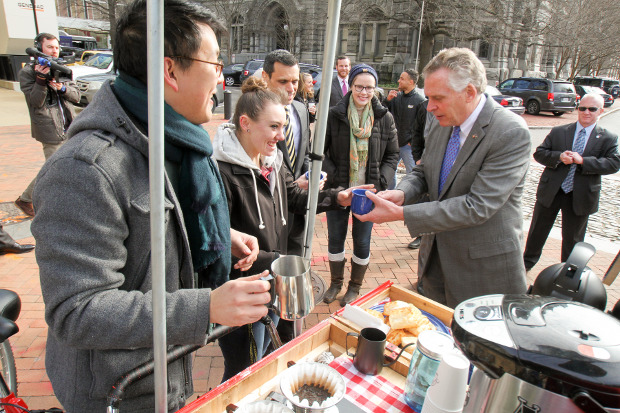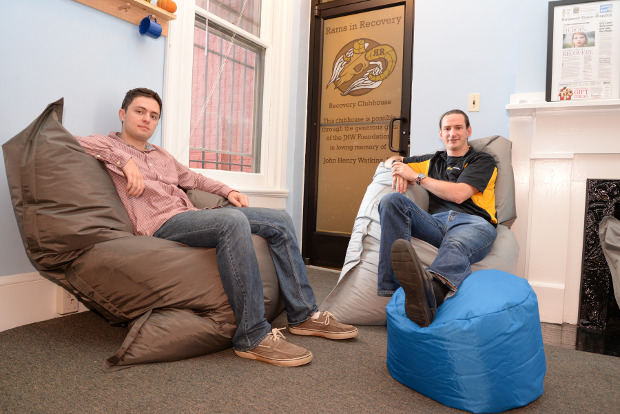
May 15, 2017 |
Exclusive Interview with Recovery Roast Founders: Tom Bannard & John Freyer
Virginia Commonwealth University is leading the way in collegiate recovery.
The Recovery Research Institute sat down with Professor John Freyer & Program Coordinator, Tom Bannard, to find out how they took a small student group & turned it into a nationally recognized recovery powerhouse.
TO START OFF, WHAT IS RAMS IN RECOVERY?
JOHN
Rams in Recovery is a collegiate recovery program at Virginia Commonwealth University (VCU) in Richmond, Virginia. It started as student group that was supported by a project team and funded through private donations. After the first two years as a student group, the university hired Tom as a part-time coordinator for Rams in Recovery, and I joined the project team then.
SO THEN, WHAT IS A RECOVERY ROAST?
JOHN
Recovery Roast Coffee was a site-specific project that introduced local recovery communities to the rich history of coffee and the complexities of roasting, tasting and preparation. The project connected VCU students in recovery to local artisan coffee roasters to create a custom roasted coffee blend with a flavor profile determined by the students.
TOM
Recovery roast started with John wanting to have a gift to give to donors. He had the idea to hold this cupping event, which was essentially wine tasting for coffee.

IS THIS THE PART WHERE THE ‘FREE HOT COFFEE BIKE’ COMES INTO PLAY?
JOHN
Yes. “Free hot coffee bike” started with recovery roast (the coffee), as we needed to figure out what to do with the coffee.
TOM
John kept bugging me, he kept showing me these Instagram feeds of bikes that were food carts, or coffee carts. They were these ridiculous contraptions. He said this is what we really need, and I said we don’t need this at all, but he kept bugging me. And he said it’s only going to cost us $5,000 and I said if you raise the rest of it, I’ll give you $1,000. And damn sure he came back a week later with the rest.
JOHN
Designed it so that it could roll around campus and help with stigma reduction that would be a way for people to take a break with persons in long term recovery.
TOM
After we built it, it sat on the shelf for two months and somebody contacted us about doing a story about it from Circa News. And so we rolled it for the first time on campus in august 2016 for this news story and the damn news story got 300k views in about a week. We were suddenly VCU famous to say the least.
JOHN
It’s been really fun since then. We got to take it out to see the governor during the legislative session. we brought it to meet the governor and talk about the issues that are important to us. The Governor met with our students and so did the President of the University so they’re both very aware of what we do. They (the students) love doing it they love taking that bike out. It creates a space for people to have face to face, one on one conversations about recovery.

HOW MUCH COFFEE HAVE YOU GIVEN AWAY SINCE THE PROJECT FIRST STARTED?
TOM
The two places the recovery roast is served is on the bike and in our Rams In Recovery club house. We go through more than 5 pounds of coffee a week, so about 250 pounds a year. That’s kind of our pace right now – it’s a substantial budget item.
WHAT WOULD YOU TELL OTHER UNIVERSITIES LOOKING TO DO SOMETHING SIMILAR TO SUPPORT THEIR STUDENTS IN RECOVERY?
TOM
Increase recovery capital on campus and access to recovery support services. Essentially, from the moment a student steps on VCU’s campus, just by being a member of the VCU community, they have increased their recovery capital because of all the resources and support available to them. It is exciting because Recovery Roast model has worked well at VCU, but the model does not have to be unique to VCU. With recovery roast, that roast is specific and custom for us, but the program model is not. We could do the same thing at multiple places. It is scalable, affordable but also very local, just like recovery.
JOHN
In terms of starting a collegiate recovery program, find your allies on campus. There are people in recovery and you might find them in unexpected places like the art school. Finding those people is a big deal and places like the Wellness Resource Center, so that you realize you are not alone; there are people who work here and will refer others to recovery. Student health and wellness centers are logical places to start in order to start an organization like this.
TOM
From an administrator perspective, if you want to make this happen, you hire staff preferably staff in recovery. You hire staff and provide space. You can’t expect to have strong community and strong long term supports if you’re just relying on students – they are busy, they have lives, and they eventually graduate. You have to put the resources into it if you want the return. The other thing that works really well for us at VCU, is inclusivity and diversity. I think recovery fits really well into that conversation. Addiction and even recovery is a marginalized status and recovery identities are hidden identities for most people. By creating spaces that are safe you can really build a robust support network really quickly and students can feel safe within those spaces.

WHAT ADVICE DO YOU HAVE FOR COLLEGE STUDENTS CONSIDERING RECOVERY?
TOM
It is important to find your tribe, find your people. If you’re somebody fortunate enough to have a collegiate recovery group on your campus, it will be a lot easier to find people like you on campus. Even if your school does not have a recovery group, look for the late night meetings that are close to campus which will be most likely to have other young people. Knowing other people in recovery is a big deal for folks. Whatever you can do to find the people you identify with and support you.
ABOUT
Dr. John Freyer, MFA is an Assistant Professor of Cross Disciplinary Media at Virginia Commonwealth University
Tom Bannard, CADC, MBA, is the Administrative Director, COBE Program Coordinator, Program Coordinator for Rams in Recovery

